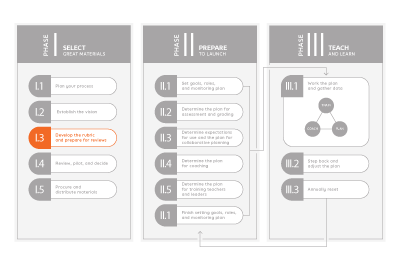Overview
The goal of Phase I is to select materials that support a clear and common vision of great instruction for the subject, with stakeholder participation in the process. Teachers are central to every great selection story and reported learning from the process when it was done well.
More About Phase IOverview
The goal of Phase II is to develop an intentional implementation plan – thinking through what it will take to use and support the materials well.
More About Phase II-
Key Action II.1: Set goals, roles, and monitoring plan
-
Key Action II.2: Determine the plan for assessment and grading
-
Key Action II.3: Determine expectations for use and the plan for collaborative planning
-
Key Action II.4: Determine the plan for coaching
-
Key Action II.5: Determine the plan for training teachers and leaders
-
FINISH KEY ACTION II.1: Set goals, roles, and monitoring plan
The goal of Phase III is to support teachers as they use the curriculum to inspire great instruction and increase student learning. At the leadership level, the focus is on listening to teachers and observing practice with a goal of continuously improving teacher support. Phase III does not end after the first year – this is a continuous improvement journey that never ends.
More About Phase III
